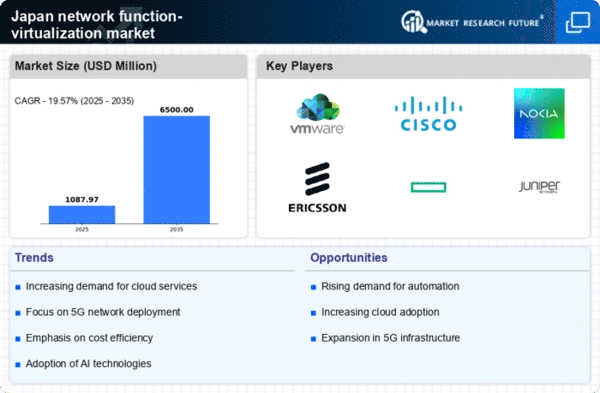Shift Towards Cost Efficiency
Cost efficiency remains a critical driver for the network function-virtualization market in Japan. Organizations are increasingly recognizing the financial benefits associated with transitioning from traditional hardware-based networks to virtualized solutions. By leveraging virtualization, companies can reduce capital expenditures on physical equipment and lower operational costs through improved resource utilization. Recent studies indicate that businesses can achieve cost savings of up to 30% by adopting network function-virtualization technologies. This financial incentive is compelling many enterprises to explore virtualization as a viable option for their networking needs. Consequently, the network function-virtualization market is likely to expand as more organizations seek to optimize their budgets while enhancing service delivery and operational efficiency.
Growing Focus on 5G Deployment
The ongoing deployment of 5G technology in Japan is significantly influencing the network function-virtualization market. As telecommunications companies invest heavily in 5G infrastructure, there is a corresponding need for advanced network solutions that can support the increased data traffic and connectivity demands. Network function-virtualization is seen as a key enabler for 5G networks, allowing for more flexible and efficient management of network resources. The Japanese government has set ambitious targets for 5G rollout, which is expected to drive substantial investments in related technologies. This focus on 5G is likely to propel the network function-virtualization market forward, as service providers seek to leverage virtualization to enhance their offerings and meet the expectations of consumers and businesses alike.
Rising Demand for Network Agility
The network function-virtualization market in Japan is experiencing a notable surge in demand for enhanced network agility. Organizations are increasingly seeking solutions that allow for rapid deployment and scalability of network services. This shift is driven by the need to adapt to changing business environments and customer expectations. According to recent data, the market is projected to grow at a CAGR of approximately 15% over the next five years. Companies are recognizing that traditional hardware-based solutions are often too rigid and slow to respond to market dynamics. As a result, virtualization technologies are being adopted to streamline operations and improve service delivery. This trend indicates a significant transformation in how network services are provisioned and managed, positioning the network function-virtualization market as a critical component of modern IT infrastructure.
Government Initiatives and Support
In Japan, government initiatives aimed at promoting digital transformation are playing a pivotal role in the growth of the network function-virtualization market. The Japanese government has been actively investing in technology infrastructure to enhance the country's competitiveness in the global market. Programs that encourage the adoption of advanced technologies, including network virtualization, are being implemented. For instance, the government has allocated substantial funding to support research and development in this area. This support is expected to drive innovation and accelerate the deployment of network function-virtualization solutions across various sectors. As a result, the market is likely to witness increased participation from both public and private entities, further solidifying its position in the technology landscape.
Integration of Artificial Intelligence
The integration of artificial intelligence (AI) into the network function-virtualization market is emerging as a transformative driver in Japan. AI technologies are being utilized to enhance network management, automate processes, and improve decision-making capabilities. This integration allows for more efficient monitoring and optimization of network performance, which is crucial in today's fast-paced digital environment. As organizations increasingly adopt AI-driven solutions, the demand for network function-virtualization is expected to rise. Reports suggest that the AI market in Japan is projected to grow significantly, which will likely have a positive impact on the network function-virtualization market as well. The synergy between AI and virtualization technologies could lead to innovative solutions that address complex networking challenges.
















